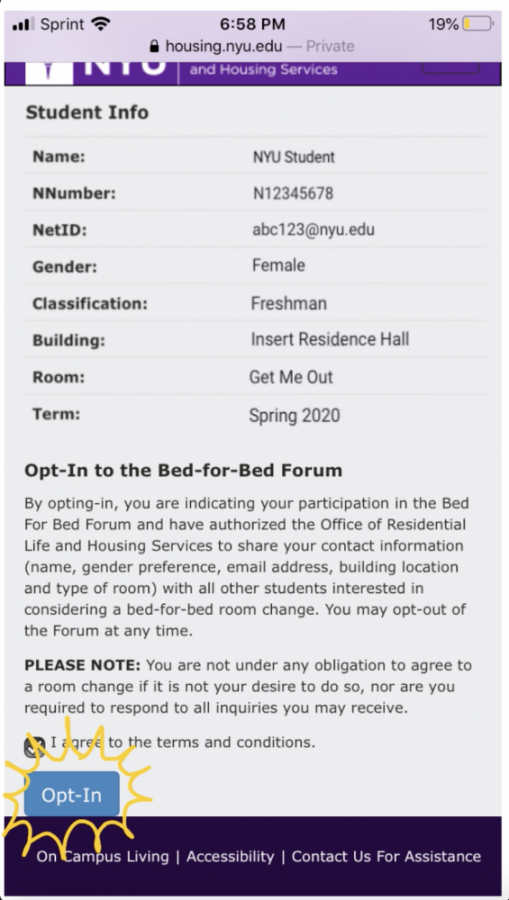When Korean-Canadian CAS first-year Sandee Park would rather take her midterm over and over again instead of relaxing in her dorm, it’s obvious something is horribly wrong. In her room, Park was less a resident and more a personal maid to her two roommates, who demanded she make their beds and clean every crumb on the floor. “The bathroom’s not going to clean itself,” was constantly echoed at her. Maybe chemistry would take her mind off of her callous cohabitants? No, they’d already invited one too many guests without her permission that she couldn’t hear her own thoughts. She turned to her comfort food, Korean rice bowls, but her roommates complained of the smell and she was sent outside.
Rinse and repeat.
Park’s former roommates in Lipton Hall routinely targeted both her and her Korean heritage during her first semester. Park’s needs were almost always waved off, and she felt she didn’t have an equal standing in the room. Although they routinely complained about her Korean food and phone calls home, they completely disregarded her boundaries.
One main conflict Park and her roommates faced regarded their lifestyles: Park preferred a quiet and relaxed atmosphere while her roommates constantly made demands and pushed their own, more social lifestyles and cultural values onto her.
“Since we’re coming from different places around the world, even though it creates a diversity, you can’t dismiss that it makes us have different upbringings and values,” she said. “When it came time to fill out our roommate agreement, we wouldn’t even agree on what was considered clean, and they didn’t think they needed my consent to do whatever they wanted.”
These cultural differences and double standards caused a rift so big between the Korean-Canadian Park and her roommates that she couldn’t ignore it. Whenever she brought anything related to her Korean heritage into the dorm, her roommates would make rude comments. She felt particularly targeted because she noticed her Mexican and Cameroonian roommates speaking in their native languages while bashing only hers.
“Every time I spoke with my parents in Korean, they would tell me to stop because it was just so annoying and send me outside,” Park stated. “I asked my Cameroonian roommate what was wrong, if she just hated the Korean language, and she accused me of racism for saying that about an African person.”
For Stern first-year and Weinstein Hall resident Priyal, who asked to be referred to by her first name only, cultural differences between her and her roommate may have been the root of their complete communication block. While Priyal was never able to confirm it, she suspected her domestic ex-roommate felt uncomfortable talking to her about certain issues because she did not want to be culturally insensitive to Priyal’s Indian heritage and nationality.
“Some of my suitemates would say my food smells weird, and I would try to understand,” Priyal said. “For example, I’m a vegetarian, and chicken smells really weird to me, but I know that other people eat it, so it’s fine. I know they aren’t used to it, but they weren’t comfortable talking about that with me at all, although they talked to the [Residence Hall Directors] about it.”
Initially, Priyal hoped to resolve the situation by asking her roommate to be more open with her and meeting with their RHD, who advised them to try better communicating one-on-one before turning to more extreme measures. But Priyal quickly reached a breaking point when her roommate constantly refused to discuss anything with her in person.
“Whenever she had a problem, she would go directly to our RA, and then to the RHD without even telling me what was going on,” Priyal said. “It was just wrong. She did not even give me the chance to correct any issues, but I told myself it was only the first week, first month, so I could compromise.”

After seeing the conflict had been escalating for months, Priyal’s RHD referred her to Bed-for-Bed. This online forum was created just prior to the Fall 2014 semester as a last resort option to help NYU students swap room spaces with each other when they faced unresolvable roommate conflicts. Now expanded, it essentially works as a dorm-centered Craigslist, where students can provide their names, dorm locations, room details and emails, in hopes of being contacted by other students for an exchange.
With such a diverse community of over 6,500 first-year students from 88 different countries, it’s no wonder the lifestyles of students in one suite can vary so greatly. A lack of communication between roommates with different lifestyles, as in the cases of Park and Priyal, is a major factor that leads to unresolvable conflicts.
Unfortunately, Park’s RA had reservations about recommending Bed-for-Bed to her residents. When Park began meeting with her about her room’s issues, she continued to urge Park toward reconciliation. Park then took the initiative to find Bed-for-Bed and obtain the required RA approval for official room swaps on her own.

“My RA didn’t really know much, and I found it on the housing portal myself,” Park explained. “I was like, wow this is a real thing, and I even asked my RA about going through with it. She told me to wait and try to see how things go first, and I really tried, but it was obvious things were going south.”
It wasn’t until a few weeks before finals that she realized swapping rooms was absolutely necessary for her safety — she heard her roommates threaten to physically beat her up behind closed doors. Park opted into the forum and tried to and a suitable new roommate, yet it didn’t yield her many quick replies. She soon began to feel helpless and trapped.
Not knowing who else to turn to, Park went to one of the authority figures within the university: her chemistry recitation instructor, Dr. Zhihua An, who made the situation clear to their professor, Dr. John Halpin. He became part of an unlikely support system for Park as she pushed through to be prioritized for a room switch.
“[My roommates] wanted me gone as soon as possible, but the RAs just weren’t taking it seriously,” Park said. “Having a support like Dr. Halpin, who has a respected position in the university and a relationship with the Dean, made things push through. He made them realize this was some real sh-t, and I needed an immediate room change.”
Although Dr. Halpin declined to make an official statement regarding his involvement in Park’s situation, he did state that he believed, as a previous graduate of NYU, it was important to help one of his students through such a difficult time.
“That’s right, I did talk to the Dean, but I didn’t do much,” Dr. Halpin said. “Of course, I cared because I also had a residential dorm experience here, and I think it’s important that everyone feels safe and comfortable, but what I did was give her a list of people [to contact]. She took the initiative, so I don’t want to make it seem like I did any more than that.”
Without Dr. Halpin’s urging, perhaps Park would have endured her roommates’ harassment for much longer without a reply from the forum. Priyal felt a similar sense of hopelessness during her own experience: out of the 10 people she contacted, only two took the time to respond, so she wasn’t able to find someone to swap rooms with until early February. Luckily, switching early on in the semester made the process relatively manageable. For Park, while Bed-for-Bed was beneficial, its inefficiency left her at the brink of disaster for the majority of her first semester. It was only during finals that she found a suitable dorm in Goddard Hall. While she and her new roommate had some lifestyle differences, Park had no regrets because of how considerate and communicative the other student was.
With little exposure and subpar measures for contacting other users, the forum certainly requires an upgrade. For a student experiencing racial harassment and discrimination in their dorm, or constantly clashing with their roommate over daily habits, switching rooms can be a better solution than one-sided compromises ever were. But without the proper — and properly functioning — resources, students might be left to deal with bigotry on their own. Beyond the institutional issues students might face, the first step to creating a less-prejudiced environment is treating each other with the dignity and respect we all deserve.
Email Sammy Tavassoli at [email protected]. A version of this article appeared in the Thursday, Feb. 20 print edition. Read more from Washington Square News’ “Housing Guide 2020.”


























































































































































